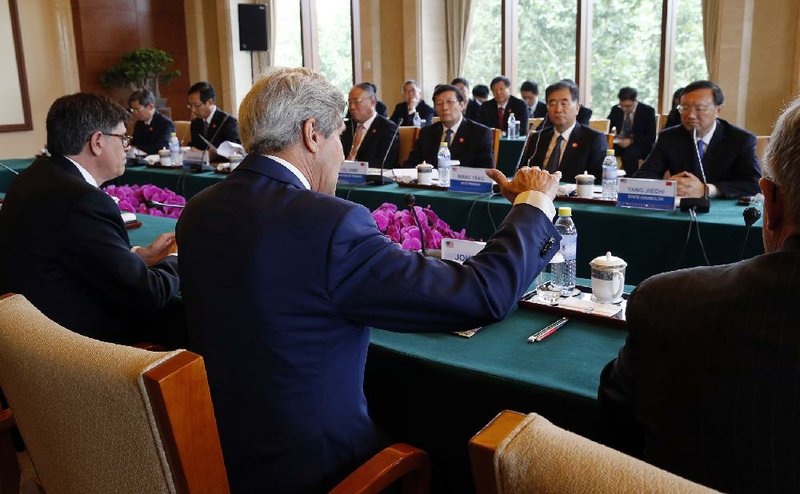BEIJING -- China's finance minister said Wednesday that the country is not planning any new stimulus measures and it is up to the United States to drive the global economy.
Lou Jiwei said that leaders are satisfied with the country's economic performance so far this year. In the first five months, he said, China had created up to 6 million jobs, 60 percent of this year's target.
Analysts say the ruling party appears willing to accept economic growth below its 7.5 percent target this year so long as the job-creation rate stays high enough to avoid political tensions.
Lou said China, which is the world's second-largest economy after the U.S., is emphasizing structural overhauls to spur economic growth and is unlikely to repeat the kind of extensive economic stimulus it did in the wake of the 2008 global financial crisis.
"Therefore, the global economic recovery depends on the situation in the United States," he told reporters at a briefing during an annual U.S.-China strategic and economic dialogue in Beijing attended by U.S. Treasury Secretary Jacob Lew.
Lou pointed out that the U.S. economy shrank at a 2.9 percent annual rate from January to March -- largely because of a brutal winter -- and said China hopes the U.S. "can take measures to ensure the momentum of growth."
He also said China hopes the U.S. can rebalance its economy by encouraging Americans to save more.
The finance minister said that during the talks Wednesday, U.S. officials had asked whether China still had to intervene in the foreign exchange rate -- a longstanding issue between the two, as the U.S. says Beijing's controls on the yuan give Chinese exporters an unfair price advantage and hurt foreign competitors. Lou said that as China's economy wasn't in full health and capital flows weren't yet normal, "it is very difficult for us to refrain" from foreign market intervention.
Domestically, Lou said that industries that have visibly suffered from a high-profile anti-corruption campaign spearheaded by President Xi Jinping -- such as high-end hotels, tobacco and luxury liquors -- have adapted to the conditions. "Some of the luxury hotels and restaurants have started to sell takeout food," he added.
He gave no additional details about the progress of the campaign and the effect it might have on the economy at large.
Relations between China and the United States must be viewed in the "long term" so both countries can keep moving in the same direction, Xi said Tuesday at the opening of the meetings at the Diaoyutai State Guesthouse in Beijing.
Secretary of State John Kerry, who joins Lew and other U.S. officials at the talks, spoke of his Shanghai-born grandfather to highlight historic links between the U.S. and China. Kerry added that differences over individual issues must not be interpreted as an "overall U.S. strategy" because "the U.S. does not seek to contain China."
Such public pledges contrast with signs of increasing wariness of each other's strategic intentions and tactics. China in November declared an air-defense identification zone over disputed areas, and the U.S. in May indicted five Chinese military officers, alleging they stole trade secrets via hacking.
China has expressed concerns that President Barack Obama's foreign-policy rebalancing toward Asia is aimed at thwarting China's growing influence in the region. It canceled cybersecurity talks set for this week and has criticized the U.S. for favoring Japan and the Philippines over China on maritime territorial disputes in the South and East China seas.
Information for this article was contributed by Louise Watt of The Associated Press and Sangwon Yoon, Xin Zhou, Henry Sanderson, Ian Katz and Ting Shi of Bloomberg News.
Business on 07/10/2014
